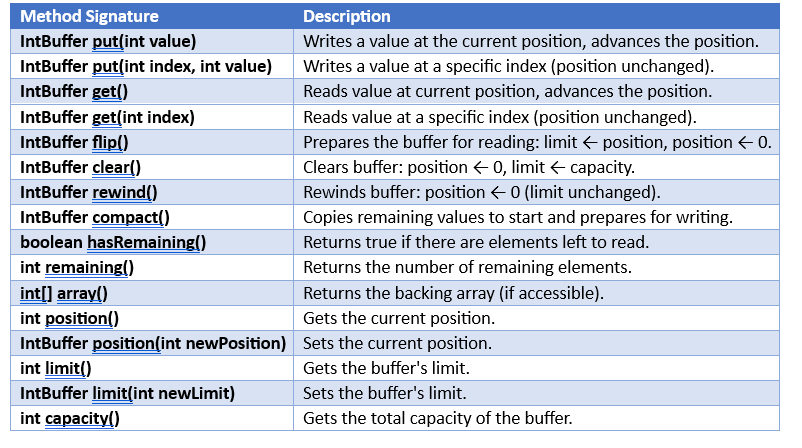IntBuffer is a class from the java.nio package in Java that allows you to work efficiently with sequences of 32-bit signed integers. It is part of the NIO (New I/O) library and supports buffer-based data manipulation useful for I/O operations, communication protocols, and performance-critical applications.IntBuffer is abstract; you create an instance using static factory methods like allocate() and wrap().
Commonly Used Methods

Simple Program using IntBuffer(Store and Display Integer Values)
import java.nio.IntBuffer;
public class SimpleIntBufferDemo {
public static void main(String[] args) {
// Allocate a buffer for 5 integers
IntBuffer buffer = IntBuffer.allocate(5);
// Put values into buffer
buffer.put(100);
buffer.put(200);
buffer.put(300);
// Switch to read mode
buffer.flip();
System.out.println("Reading IntBuffer:");
while (buffer.hasRemaining()) {
System.out.println(buffer.get());
}
}
}Problem Statement
LotusJavaPrince is building a performance dashboard that logs CPU load percentages from various nodes in a distributed banking system. Mahesh gives him a task:
- Store these load readings in an
IntBuffer. - Filter out any values above 90 (considered CPU overload).
- Display normal load values with index positions for analysis.
Help LotusJavaPrince implement this using IntBuffer.
import java.nio.IntBuffer;
public class CpuLoadMonitor {
public static void main(String[] args) {
// Simulated CPU load data from 10 servers
int[] cpuLoads = {45, 67, 91, 88, 77, 95, 60, 84, 93, 70};
// Wrap the CPU load array
IntBuffer inputBuffer = IntBuffer.wrap(cpuLoads);
// Allocate a new buffer to store normal loads (<= 90)
IntBuffer normalLoadBuffer = IntBuffer.allocate(cpuLoads.length);
// Filter values
while (inputBuffer.hasRemaining()) {
int load = inputBuffer.get();
if (load <= 90) {
normalLoadBuffer.put(load);
}
}
// Prepare output buffer for reading
normalLoadBuffer.flip();
// Display filtered CPU loads
System.out.println("Normal CPU Load Values (Filtered by LotusJavaPrince):");
int index = 0;
while (normalLoadBuffer.hasRemaining()) {
System.out.println("Node[" + index + "] Load: " + normalLoadBuffer.get());
index++;
}
}
}Output
Normal CPU Load Values (Filtered by LotusJavaPrince):
Node[0] Load: 45
Node[1] Load: 67
Node[2] Load: 88
Node[3] Load: 77
Node[4] Load: 60
Node[5] Load: 84
Node[6] Load: 70Code language: CSS (css)The IntBuffer class in Java NIO is a specialized buffer designed for handling sequences of 32-bit int values efficiently. Extending the abstract Buffer class, it provides all the standard buffer features such as position, limit, capacity, and mark, but tailored for integer data.
IntBuffer plays a vital role in high-performance applications that need to manipulate large volumes of integer data, such as numerical simulations, image processing, file I/O, or network protocols. With support for heap and direct buffers, it enables memory-efficient and fast data access, especially in conjunction with NIO channels.
